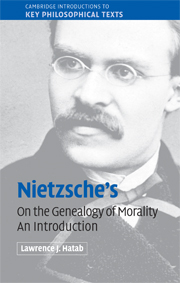Book contents
7 - The Genealogy and moral philosophy
Published online by Cambridge University Press: 05 June 2012
Summary
Against the background of the previous chapter, I want to explore further the possibilities of an ethical sense in Nietzsche's philosophy. To prepare this discussion it would be useful to provide a brief sketch of familiar models in moral philosophy and to situate Nietzsche in relation to these traditions.
MODERN MORAL PHILOSOPHY
The modern Scientific Revolution transformed the way nature is understood. With priority given to objectification, mathematization, and mechanization, then notions of meaning, value, and purpose were stripped from the environing world in deference to nature conceived as a set of causal forces and verifiable facts. Whatever space could be found for moral values or notions of right and wrong would have to be located in the human subject and not in any objective condition, that is, not in the natural world itself. Usually the turn to the subject aimed to retain elements of rationality, but in the subject's practical reason rather than the scientific execution of theoretical reason.
Modern moral theories in different ways reflected the general intellectual developments in modern thought. The model of a free rational individual took shape in ethics as the promotion of free inquiry and individual autonomy in determining what is right and wrong, as opposed to defining norms according to unexamined dictates of religion, custom, habit, or various traditional authorities. Modern moral theory turned to the reflective subject as the self-grounding basis of moral inquiry and decision methods.
- Type
- Chapter
- Information
- Nietzsche's 'On the Genealogy of Morality'An Introduction, pp. 204 - 242Publisher: Cambridge University PressPrint publication year: 2008



